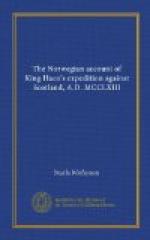King Haco next sailed in to the Calf of Mull,[94] where he stayed some nights. There King Dugal and Allan his brother took leave of the King, who gave them those estates which King John formerly possessed—Magnus King of Man and other Hebridians had returned home before. He gave Bute to Rudri, and Arran to Margad. To King Dugal he gave the Castle in Kintire which Guthorm Backa-kolf had besieged and taken during the summer. In this expedition King Haco regained all those provinces which King Magnus Barefoot had acquired, and conquered from the Scotch and Hebridians, as is here narrated.
21.
The Lord of Egda[95] soon recovered all those territories on the continent which had been subjected by the Scottish tribes. In the western regions none durst contend with the offspring of Ingui.[96] His army, like a gathering tempest, indicated desolation to the dominions of his imperious adversary.
King Haco, leaving the calf of Mull, sailed to Rauney. Here he overtook Balti a vassal of Shetland, with those who had been sent to the Orkneys, and to whom a permission had been given of returning to Norway. King Haco from Rauney steered northwards. The wind being unfavourable, he made for Westerford in Sky, and ordered the islanders to supply him with provisions. Next he sailed past Cape Wrath,[97] and arriving at Dyrness, there happened a calm, for which reason the King ordered the fleet to be steered into Gia-ford.[98] This was done on the feast of the two apostles, Simon and Jude,[99] which fell on a Sunday. The King spent the night there. On this festival, after mass had been sung, some Scots, whom the Norwegians had taken prisoners, were presented to the King. The King detained one as a hostage, and sent the others up the country, at liberty, on giving a promise that they would return with cattle. On the same day it happened that nine men belonging to Andrew Biusa’s ship went ashore to procure water, and an outcry was soon heard from the mainland. The crew, therefore, immediately setting off from their ships, found two men swimming, though badly wounded, and took them on board; the other seven, unarmed, and incapable of making any defence, remained by their boat (which was left aground by the tide) and were killed by the Scotch. The Norwegians landing, carried away their dead; and the Scotch, in the meantime, fled to a wood. On the Monday, King Haco sailed from Gia-ford after having liberated the Scottish hostage, and sent him ashore. The King in the evening reached the Orkneys, and anchored in a certain sound, to the north of Asmundsvo,[100] from whence he, with the greatest part of his fleet, steered for Ronaldsvo. In passing over Pentland Firth, a terrible whirlpool appeared, and in which a ship from Rygia-fylke, with all on board, perished. John of Hestby was driven through the straits, and was very near being swallowed up in the gulf; but, by the mercy of God, his ship was forced east to the ocean, and he made for Norway.




